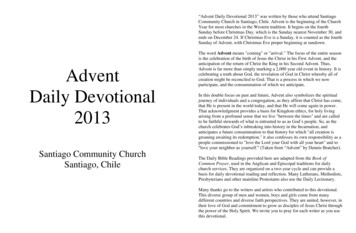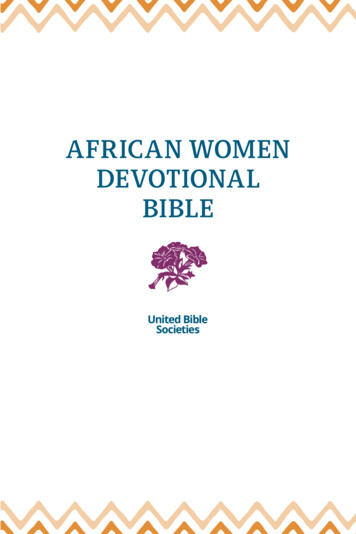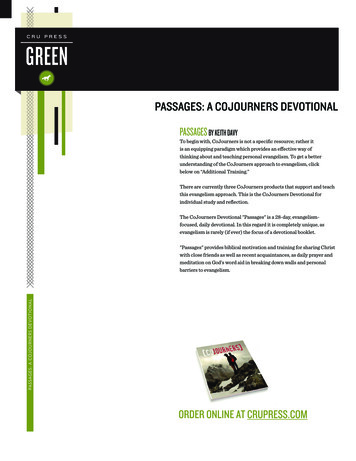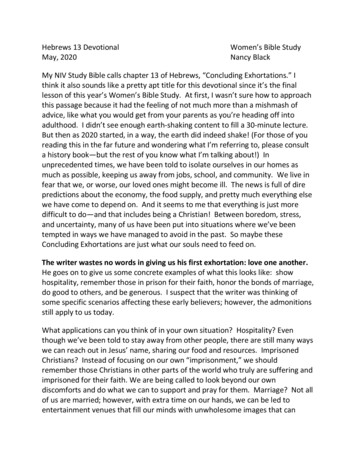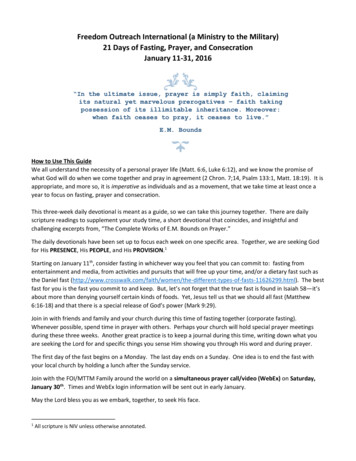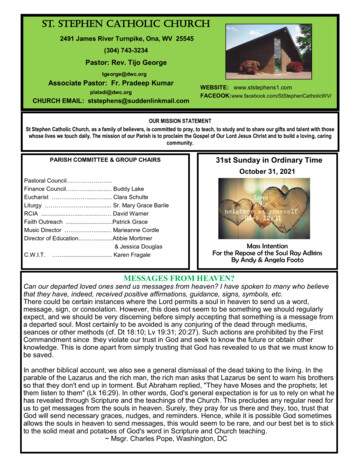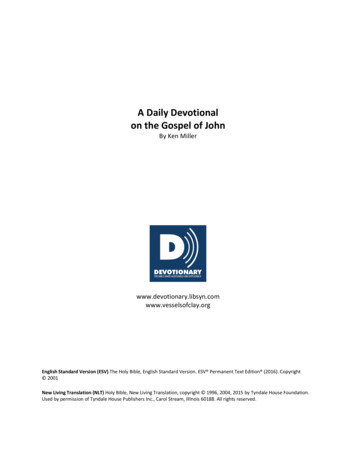
Transcription
A Daily Devotionalon the Gospel of JohnBy Ken orgEnglish Standard Version (ESV) The Holy Bible, English Standard Version. ESV Permanent Text Edition (2016). Copyright 2001New Living Translation (NLT) Holy Bible, New Living Translation, copyright 1996, 2004, 2015 by Tyndale House Foundation.Used by permission of Tyndale House Publishers Inc., Carol Stream, Illinois 60188. All rights reserved.
2 2020 Devotionary / devotionaryblog.com / devotionary.libsyn.comKen Miller
3TABLE OF CONTENTSJohn 1:1-5: In the Beginning . 5John 1:6-13: The Light and the Right . 9John 1:14-18: God in Human Flesh . 13John 1:19-28: No Comparison . 17John 1:29-34: The Lord Will Provide. 23John 1:35-51: Come and You Will See . 27John 2:1-11: Manifested Glory . 31John 2:12-22: Cleaning House . 35John 2:23-3:2: Misguided Belief . 39John 3:3-8: Born from Above. 43John 3:9-18: Believe It, or Not . 47John 3:19-21: Not What He Expected . 51John 3:22-30: A Heavenly Calling . 57John 3:31-36: God Is True . 61John 4:1-6: An Unscheduled and Ill-Advised Rest Stop . 65John 4:7-15: The Gift of God . 69John 4:16-26: In Spirit and Truth . 73John 4:27-38: Not What They Expected . 77John 4:39-45: The Savior of the World . 81John 4:46-54: The Man Believed the Word . 85John 5:1-12: Lord of the Sabbath . 89John 5:13-18: Working on the Sabbath . 93John 5:19-24: The Son Gives Life . 97John 5:25-29: Do Not Marvel at This . 101John 5:30-36: Proof Positive . 105John 5:37-47: How Can You Believe? . 109John 6:1-15: Not Enough . 113John 6:16-21: Hardened Hearts . 117 2020 Devotionary / devotionaryblog.com / devotionary.libsyn.comKen Miller
4John 6:22-34: Give Us That Bread! . 121John 6:35-40: Believe on Me . 125John 6:41-51: Whoever Believes . 129John 6:52-59: He Will Live Because of Me . 133John 6:60-66: Fairweather Followers . 137John 6:67-71: The Holy One of God . 141John 7:1-10: The Disbelief of Family and Foes . 145John 7:11-24: Misplaced Judgment . 149John 7:25-31: You Have No Idea! . 153John 7:32-36: Return to Sender . 157John 7:37-39: The Spirit Who Gives Life . 161John 7:40-52: Divinely Divisive . 165John 7:53-8:11: A Sinner Condemned, Unclean . 169John 8:12-20: The Light of the World . 173John 8:21-30: Who Are You? . 177John 8:31-41: The True Offspring of David. 181John 8:42-50: Children of the Devil . 185John 8:51-59: I Am! . 189John 9:1-7: A Man Born Blind . 193John 9:8-23: Light and Darkness . 197John 9:24-41: Are We Also Blind? . 201John 10:1-21: The Good Shepherd . 205John 10:22-31: A Case of Contrasts . 209John 10:32-42: Believe the Works . 213 2020 Devotionary / devotionaryblog.com / devotionary.libsyn.comKen Miller
5In the Beginning1In the beginning was the Word, and the Word was with God, and the Word was God. 2 He wasin the beginning with God. 3 All things were made through him, and without him was not anything made that was made. 4 In him was life, and the life was the light of men. 5 The light shinesin the darkness, and the darkness has not overcome it. – John 1:1-5 ESVAs suggested by the book’s title, the author of the fourth Gospel is believed to be the apostleJohn. This belief is based on the writings of the early church fathers and evidence from withinthe text itself. One of the key internal proofs for John’s authorship is found in chapter 21. Thescene depicted in this passage is that of the resurrected Christ appearing to His disciples.Believing their Messiah and friend to be dead, seven of them have returned to their fishingboats. Jesus appears on the shore and calls out to them, but they fail to recognize him. Thisstranger suggests that they cast their nets on the other side of the boat and, when they do,they find their nets full of fish. And, in verse 7, the author states that the first to recognize thestranger as Jesus was “That disciple whom Jesus loved” (John 21:7 ESV).This is a direct reference to an earlier event in the life of Jesus when He had gathered Hisdisciples in the upper room to take the Passover meal. At one point in the evening, Jesusannounced that one of them would betray Him. And the author describes an exchangebetween Simon Peter and the “disciple whom Jesus loved.”One of his disciples, whom Jesus loved, was reclining at table at Jesus' side, so SimonPeter motioned to him to ask Jesus of whom he was speaking. So that disciple, leaningback against Jesus, said to him, “Lord, who is it?” – John 13:23-25 ESVJohn was part of the inner circle, the group of three disciples whom Jesus invited to join Him onthe mountaintop to witness His transfiguration. The other two members of this group werePeter and James. Throughout this Gospel account, the author refers to John six times, not byname, but by the third-party designation, “the disciple whom Jesus loved.” Even whendescribing the crucifixion, the author records that Jesus personally addressed the “disciplewhom he loved,” assigning him the task of caring for His mother, Mary.When Jesus saw his mother and the disciple whom he loved standing nearby, he said tohis mother, “Woman, behold, your son!” Then he said to the disciple, “Behold, yourmother!” And from that hour the disciple took her to his own home. – John 19:26-27 ESVAnd the author later identifies himself as the one whom Jesus loved.This is the disciple who is bearing witness about these things, and who has written thesethings, and we know that his testimony is true. – John 21:24 ESV 2020 Devotionary / devotionaryblog.com / devotionary.libsyn.comKen Miller
6This should not be construed as a prideful statement on John’s part, but an expression of hisamazement at being the recipient of Jesus’ underserved love. Nowhere in the book does he usehis own name. It is almost as if he is deliberately trying to minimize his own importance in orderto make much of Christ. After all, his entire purpose for writing this book was to showcase thelife and ministry of Jesus, his friend, teacher, and Messiah. But what sets John’s account apartfrom the other gospels is its emphasis on the deity of Christ. Unlike Matthew, Mark, and Luke,John does not open up with a description of Jesus’ birth. Instead, he begins with a descriptionof “the Word” – his unique reference to Jesus that is designed to accentuate His deity.In the Aramaic translations of the Old Testament, the word used to describe God was memra.In the Greek, that word becomes logos. John specifically chose this word in order to stress thedivinity of Jesus. Rather than beginning His gospel with the birth of Christ, John promotes theeternality of the one who came in the form of a baby. John stresses that “the Word” was “in thebeginning” and “the Word was with God” (John 1:1 ESV). He stresses the preexistence of Christand describes Him as being “fully God” (John 1:1 NET). For John, the most important thingabout Jesus was His divinity. He had been more than just a man. He was the God-man. To John,the deity and humanity of Jesus were inseparable and vital to understanding His entire ministry,message, and mission.Jesus had been a co-creator of the universe and all it contains. He was the second person of theTrinity, who had preexisted His own incarnation. According to Paul, Jesus had existed in theform of God but had left His place in heaven in order to take on human flesh.Christ Jesus, who, though he was in the form of God, did not count equality with God athing to be grasped, but emptied himself, by taking the form of a servant, being born inthe likeness of men. – Philippians 2:5-7 ESVJohn will refer to the concept of “life” 36 times in his gospel. And he describes Jesus as theauthor and source of all life.In him was life, and the life was the light of men. – John 1:4 ESVLong before Jesus was born in Bethlehem, He had existed in eternity past, and He had played avital role in the creation of the universe, giving life and vitality to every living thing. What Goddeclared to be, Jesus brought into existence. Out of the darkness that enveloped the precreation scene, Jesus brought life and light into existence.In the beginning, God created the heavens and the earth. The earth was without formand void, and darkness was over the face of the deep. And the Spirit of God was hoveringover the face of the waters.And God said, “Let there be light,” and there was light. And God saw that the light wasgood. – Genesis 1:1-3 ESV 2020 Devotionary / devotionaryblog.com / devotionary.libsyn.comKen Miller
7Jesus was the source of that light. And John is emphasizing that the light had penetrated thedarkness once again. This time, in the form of the incarnate Christ, who entered into the worldas light in the darkness, bringing life to those who were spiritually dead because of their sinfulstate.John’s view of Jesus is that of God entering the world. He is the same light that penetrated thedarkness of the pre-creation void and filled it with life, meaning, beauty, and fruitfulness. Andthis same light had appeared a second time, entering the sin-darkened world in which Johnlived, shining the light of God’s life-giving glory into the hidden recesses of men’s hearts. Johnhimself had been dramatically transformed by his own encounter with the Light of the world.You can see the parallels between these opening verses of John’s gospel and those found in thefirst of the three letters he penned.That which was from the beginning, which we have heard, which we have seen with oureyes, which we looked upon and have touched with our hands, concerning the word oflife—the life was made manifest, and we have seen it, and testify to it and proclaim toyou the eternal life, which was with the Father and was made manifest to us— thatwhich we have seen and heard we proclaim also to you, so that you too may havefellowship with us; and indeed our fellowship is with the Father and with his Son JesusChrist. And we are writing these things so that our joy may be complete.This is the message we have heard from him and proclaim to you, that God is light, andin him is no darkness at all. – 1 John 1:1-5 ESVJesus was “from the beginning.” He was “the life made manifest” or visible. He was “the lightof men” who “shines in the darkness.” And because of His divinity, “in him is no darkness at all.”John has set the stage for the rest of his account. He is now prepared to introduce Jesus, theGod-man, and to describe how divinity took on humanity, or as he puts it, how “the Wordbecame flesh and dwelt among us” (John 1:14 ESV). 2020 Devotionary / devotionaryblog.com / devotionary.libsyn.comKen Miller
8 2020 Devotionary / devotionaryblog.com / devotionary.libsyn.comKen Miller
9The Light and the Right6There was a man sent from God, whose name was John. 7 He came as a witness, to bearwitness about the light, that all might believe through him. 8 He was not the light, but came tobear witness about the light.9The true light, which gives light to everyone, was coming into the world. 10 He was in the world,and the world was made through him, yet the world did not know him. 11 He came to his own,and his own people did not receive him. 12 But to all who did receive him, who believed in hisname, he gave the right to become children of God, 13 who were born, not of blood nor of thewill of the flesh nor of the will of man, but of God. – John 1:6-13 ESVUp to this point in his gospel account, the apostle John has yet to mention the name of Jesus,choosing instead to refer to Him as the Word, the life, and the light. It seems that John isattempting to establish, from the outset, the divinity and eternality of Jesus. The birth of Jesus,while important to John, was only significant because the Word of God who was God took onhuman flesh. The co-creator of the universe became one with His creation by assuming thelowly nature of a man. The apostle Paul describes this divine demotion in stark terms:he gave up his divine privileges;he took the humble position of a slaveand was born as a human being – Philippians 2:7 NLTJohn was not trying to underplay the humanity of Jesus. He had spent more than three years ofhis life living with and learning from Jesus. John had shared many meals with Jesus and seenHim fall asleep in the bow of a fishing boat, exhausted from the day’s activities. He had watchedas Jesus wept over Jerusalem and the death of His friend, Lazarus. And he had been an eyewitness to the gruesome crucifixion of Jesus, watching in helplessness as his friend and teacherendured excruciating pain and eventually gave up His life. But John knew that the birth, life, anddeath of Jesus were meaningless if Jesus was not the Word of God and the light of men.And John recalls how God had prefaced the arrival of Jesus in human form by sending a witness,a martyria – one who testifies. Unlike Jesus, this witness was a mere “man.” But he had beensent by God. In that sense, he followed in a long line of other men, the prophets of the OldTestament, whom God had sent to proclaim His Word to His chosen people.But the people of Israel had endured a nearly 400-year period of silence, with no prophets orwitnesses for God appearing on the scene. Malachi, the last of the prophets disappeared off thescene around 400 B.C. So, for four long centuries, the people of God had no word from God. Hehad gone silent. And those years had been anything but pleasant. The Israelites had no king andfound themselves under the successive rules of the Persians, the Greeks, and, eventually, theRomans. Their land was under constant occupation by enemy forces, and they were subjectedto the humiliation of living under Gentile rule. In 63 B.C., the Romans conquered Israel andsubjected the land to military occupation and heavy taxation. 2020 Devotionary / devotionaryblog.com / devotionary.libsyn.comKen Miller
10The people of God were relegated to living as little more than slaves in what had once been theland of promise. And their dire circumstances created in them an intense desire for the arrivalof their long-awaited Messiah. The prophets had spoken of one who would come and rescuethem from their suffering. He would be a warrior-king like David had been, wielding his swordon behalf of the downtrodden people of Israel and delivering them from their enemies. Butwith each passing year, their hopes of rescue grew dimmer as the Messiah’s arrival failed totake place.But John emphasizes that there was hope. A light had pierced the darkness. A baby had beenborn who would prove to be the very one for whom the Israelites had been waiting. And thatbaby’s birth had been heralded by angels, proclaiming “the good news of great joy” (Luke 2:10ESV).“For unto you is born this day in the city of David a Savior, who is Christ the Lord.” – Luke2:11 ESVThe word, “Christ” is the Greek equivalent of “Messiah.” The angels were announcing thearrival of the Savior of Israel. The 400-years of silence had been broken. The long period ofdarkness had been broken by the arrival of the light of the world.Eight days after His birth, the parents of Jesus took Him to the temple in Jerusalem to becircumcised. There, a “righteous and devout” man named Simeon pronounced a blessing on thebaby.“Lord, now you are letting your servant depart in peace,according to your word;for my eyes have seen your salvationthat you have prepared in the presence of all peoples,a light for revelation to the Gentiles,and for glory to your people Israel.” – Like 2:29-32 ESVThe light had come. And some 30 years later, John the Baptist would begin to testify of thearrival of the light. The infant had become an adult and the earthly ministry of Jesus was aboutto begin. John the Baptist was given the responsibility to act as God’s herald, announcing thearrival of the Messiah.In those days John the Baptist came preaching in the wilderness of Judea, “Repent, forthe kingdom of heaven is at hand.” For this is he who was spoken of by the prophetIsaiah when he said,“The voice of one crying in the wilderness:‘Prepare the way of the Lord;make his paths straight.’” – Matthew 3:1-3 ESV 2020 Devotionary / devotionaryblog.com / devotionary.libsyn.comKen Miller
11John makes it clear that John the Baptist “was not the light, but came to bear witness about thelight” (John 1:8 ESV). He was the messenger, not the Messiah. His job was to proclaim thearrival of the King and His Kingdom. And John the Baptist knew his place, fully recognizing thatJesus was someone and something special. He humbly announced, “Though his ministry followsmine, I’m not even worthy to be his slave and untie the straps of his sandal” (John 1:27 NLT).And yet, the apostle John records that the good news regarding the arrival of the light of menreceived an unenthusiastic response from the people.The true light, which gives light to everyone, was coming into the world. He was in theworld, and the world was made through him, yet the world did not know him. – John1:9-10 ESVYou can almost sense the disbelief and disgust in John’s words. How could these people fail torecognize the arrival of the light? The creator of the universe had penetrated the darkness oftheir world and they acted as if nothing had happened. They were completely oblivious to themomentous nature of what was taking place right in front of them. And, to make mattersworse, John describes the failure of the Israelites to recognize and receive their long-awaitedMessiah.He came to his own, and his own people did not receive him. – John 1:11 ESVThe one they had longed for had finally appeared and they had chosen to reject Him. But Johnmakes it clear that not all had rejected Jesus. He had been one of a handful of Jews who hadchosen to follow Jesus because they believed Him to be the Messiah. John had been joined byPeter, who had said of Jesus, “You have the words that give eternal life” (John 6:68 NLT). It wasPeter who also said of Jesus, “You are the Christ, the Son of the living God” (Matthew 16:16ESV).And John makes it clear that all those who received Jesus and “believed in his name, he gavethe right to become children of God” (John 1:12 ESV). John is writing these words after the fact– long after Jesus’ death, resurrection, and ascension. He is writing after the events ofPentecost when the Spirit of God had descended upon the disciples gathered in the upperroom. John is penning these words with full confidence that Jesus was who He had claimed tobe and who Peter had testified Him to be: “the Christ, the Son of the living God.”And because Jesus was the Christ, the Son of the living God, all those who believed in Himreceived life. “In him was life, and the life was the light of men” (John 1:4 ESV). And that lifewas eternal in nature. The creator-God had given men their initial life, but the Son of the livingGod, the light of the world, had made it possible for men to have everlasting life. They were“were born, not of blood nor of the will of the flesh nor of the will of man, but of God” (John1:13 ESV). 2020 Devotionary / devotionaryblog.com / devotionary.libsyn.comKen Miller
12John is describing the new birth, the Spirit-empowered transformation that takes place in anindividual’s life when they place their faith in Jesus. It is what Jesus described to the Pharisee,Nicodemus.“I tell you the truth, unless you are born again, you cannot see the Kingdom of God.”– John 3:3 NLTAnd Jesus qualified His statement by adding, “Humans can reproduce only human life, but theHoly Spirit gives birth to spiritual life” (John 3:6 NLT). And that is John’s point in this passage.The new birth is not like human birth. It is not the result of human initiative. It is the miraculouswork of God, made possible through the birth, death, burial, and resurrection of His Son, JesusChrist. Those who received Jesus as the Christ and believed in His name as the Son of Godenjoyed the amazing benefit of eternal life. They became children of God. Their acceptance ofthe Light provided them with the right to be adopted into God’s family. It was just as Jesus hadtold Nicodemus:“For this is how God loved the world: He gave his one and only Son, so that everyonewho believes in him will not perish but have eternal life. God sent his Son into the worldnot to judge the world, but to save the world through him.” – John 3:16-17 NLTThe Light had come. And He had made possible the right to become a child of God. But beliefwas the key. Faith was the means by which eternal life became accessible and possible.“to all who did receive him, who believed in his name, he gave the right to becomechildren of God.” – John 1:12 ESV 2020 Devotionary / devotionaryblog.com / devotionary.libsyn.comKen Miller
13God in Human Flesh14And the Word became flesh and dwelt among us, and we have seen his glory, glory as of theonly Son from the Father, full of grace and truth. 15 (John bore witness about him, and cried out,“This was he of whom I said, ‘He who comes after me ranks before me, because he was beforeme.’”) 16 For from his fullness we have all received, grace upon grace. 17 For the law was giventhrough Moses; grace and truth came through Jesus Christ. 18 No one has ever seen God; theonly God, who is at the Father’s side, he has made him known. – John 1:14-18 ESVIn verse 14 John returns to the focal point of his entire gospel: The Word of God. But now, headds another crucial element to the identity of this one who “was in the beginning with God”(John 1:2 ESV). This life-giving “light” penetrated the darkness of the sin-saturated world.He was in the world, and the world was made through him, yet the world did not knowhim. – John 1:10 ESVAnd adding an important point of specificity, John states:He came to his own, and his own people did not receive him. – John 1:11 ESVBut how did He He come? In what form did the Word of God appear? In verse 14, John sharesthe incredible truth regarding the incarnation – the miraculous moment when God took onhuman flesh. In this one verse, John brings together the two seemingly opposing doctrines ofGod’s transcendence and immanence. The holy and wholly righteous God of the universe notonly made Himself known to mankind, He became one with them. the Word became flesh and dwelt among us – John 1:14 ESVGod had made Himself known before. He had regularly conversed with Adam and Eve in thegarden. He spoke to Noah and Abraham. He appeared to Moses in the form of the burningbush. He revealed Himself to the people of Israel through the pillars of fire and smoke that ledthem through the wilderness. And God had repeatedly spoken to His prophets, providing themwith the words to convey to His rebellious people, warning them of the judgment to come.But what John is describing here is something different altogether. He is declaring that deityand humanity became one. The God of the universe stepped out of His heavenly palace andtook up residence among us. Jesus, the Son of God, left His throne in glory and willinglyassumed the nature of an ordinary human being. The apostle Paul describes this remarkabletransformation this way: though he was in the form of God, did not count equality with God a thing to begrasped, but emptied himself, by taking the form of a servant, being born in the likenessof men. – Philippians 2:6-7 ESV 2020 Devotionary / devotionaryblog.com / devotionary.libsyn.comKen Miller
14At the time at which John wrote his gospel, there would have been few who denied theexistence of Jesus. His ministry had made Him a celebrity throughout Judea. His miracles andmessages had attracted huge crowds which gained Him the attention of the religious andpolitical leaders. Ultimately, Jesus’ growing celebrity status had threatened the powerful Jewishreligious leaders, so they had Him crucified. And even that fateful event had been wellattended and well-documented. So, there would have been little debate over the humanity ofJesus.But the deity of Jesus was a whole other matter. One of the primary reasons Jesus had beencrucified was because the Jewish religious leaders had deemed Him guilty of blasphemy, forhaving claimed to be God. At one point, Jesus had said to a group of Pharisees, “I and theFather are one” (John 10:30 ESV). And their immediate reaction had been to stone Him todeath. And they had justified their action by saying, “It is not for a good work that we are goingto stone you but for blasphemy, because you, being a man, make yourself God” (John 10:33ESV).On another occasion, Jesus had said to the religious leaders: “Truly, truly, I say to you, beforeAbraham was, I am” (John 8:58 ESV), and again, they responded by picking up stones to killHim. Why? Because with His seemingly innocuous statement, Jesus had identified Himself asGod. He had purposefully used the identifier “I am,” a direct reference to God’s own selfidentification spoken to Moses at the burning bush.God said to Moses, “I am who I am.” And he said, “Say this to the people of Israel: ‘I amhas sent me to you.’” – Exodus 3:14 ESVThe religious leaders had picked up on Jesus' meaning and immediately understood that He wasclaiming to be divine. But they refused to accept that Jesus was anything but a man. He wasnothing more than a non-descript, uneducated rabbi from the backwater town of Nazareth. Hemay have been
2020 Devotionary / devotionaryblog.com / devotionary.libsyn.com Ken Miller 5 In the Beginning 1 In the beginning was the Word, and the Word was with God, and the Word was God.2 He was in the beginning with God. 3 All things were made through h

